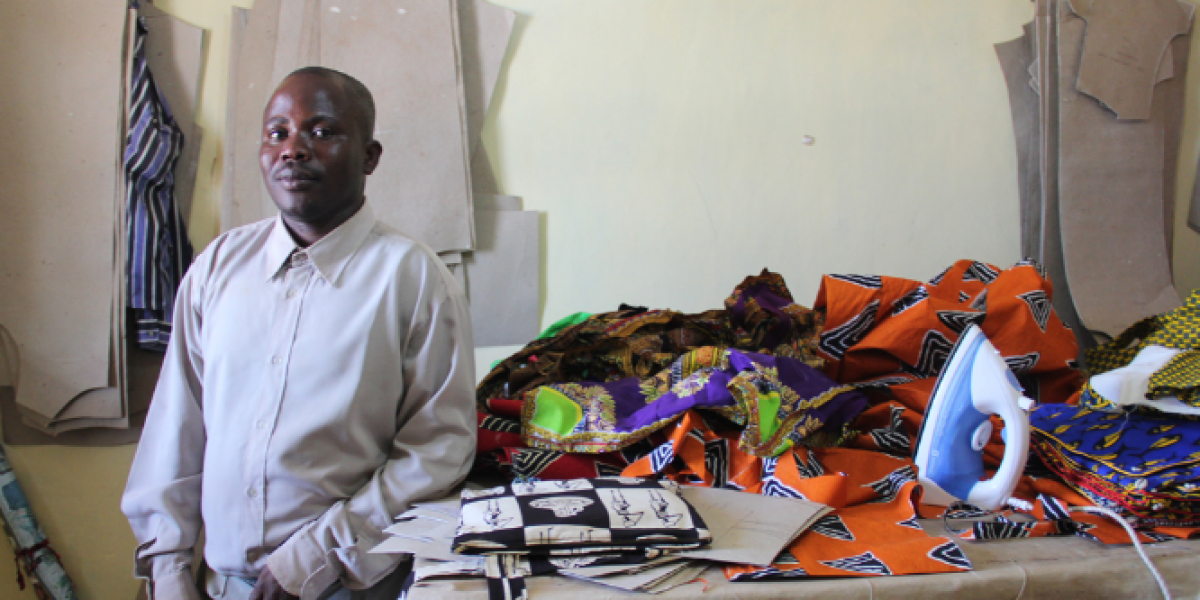Kenya: New Skills for a Better Tomorrow
31 March 2017|Angela Wells

When Jacob arrived in Nairobi eight years ago, he quickly learned he would no longer be able to work as a high school teacher, as he used to before fleeing the Democratic Republic of Congo. After a series of frustrating months trying to secure a safe place to live and an income, he met Beatrice Etoo Sadi, a Congolese woman who gave him the best gift he could have asked for – training in an employable skill.
She was paying forward the gift she had learned years before in a Jesuit Refugee Service tailoring course. Today, however, through training Jacob and other refugees, her skills have made a much bigger impact on her community than she could have imagined.
After buying his own sewing machine, Jacob began to network with others in his community who were pursuing the same career path. He eventually met Simbi and Majaliwa who had similarly learned tailoring skills upon arriving in Kenya – Simbi from his wife and Majaliwa from a different JRS training course. The collective then received a loan from small business loan as well as two sewing machines from JRS. They have built up from there.
Together they started a small-scale cooperative and community-based organisation, but were able to scale up after meeting Renatha, a Brazilian entrepreneur, who began to sell their creations in Brazil. She eventually brought in fashion designers and, along with the three men, launched a company, L’Afrikana. L’Afrikana now employs 10 refugee tailors to make women’s fashion and home design pieces. They use a mix of fabrics from around the world, but try to use African fabrics from Nairobi when they can.
Jacob, Simbi, and Majaliwa give back to their community by teaching tailoring skills to new students, and eventually giving them the chance to join their business team. They focus on women who are struggling to adapt to life in Nairobi and overcome struggles due to displacement in urban settings. In addition to providing this training, L’Afrikana has also brought in a volunteer counsellor to help their tailoring students overcome the traumatic experiences many of them have been through.
“I was moved by seeing more refugees coming in dangerous situations and in need of assistance. We decided to provide them with protection through providing education in a new skill,” said Jacob.
“All the students have one challenge or another. Some need medication for serious complications or an income to live safely in Nairobi, while others have been affected by sexual violence. We don’t want to turn anyone away so we give them a hand up and not a hand out,” said Simbi.
“When I came to Nairobi, I first went to JRS for emergency assistance. Then I started to care for myself, and now I care for others. I see myself as a moulder, someone who heats metal and moulds it into something good,” he continued. Simbi and the other L’Afrikana leaders have compiled their earnings from the business to educate nearly 200 refugee and Kenyan students. They want to make sure all children have the chance to learn, but know that even public school fees are too much for most families. Instead, they pay salaries for local teachers who give lessons to children from low income backgrounds at a local school on a nearby church’s grounds.
The men hope that in 2016, they can not only expand this school, but also scale up their business to become a Kenya-based social enterprise. In order to generate substantial revenue, however, they will need some outside investments. “The impact from the CBO is good, but we could become a lot more scalable and more socially innovative if we had some bigger investments. We could invest in a license to import material, more machines and expand to new markets, for example in Europe,” said Leonardo Freitas, CEO of L’Afrikana.
For now, Jacob, Simbi and Majaliwa are taking their business one step at a time. “A step in life is a lesson, every step is class. In this life, we need to learn everything we can. I never thought I’d be a tailor, but look at me now. The person I was when I arrived in Kenya and the person I am today are totally different,” said Jacob.



